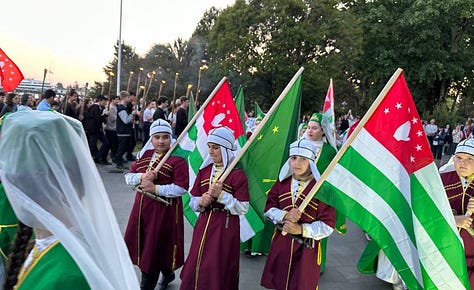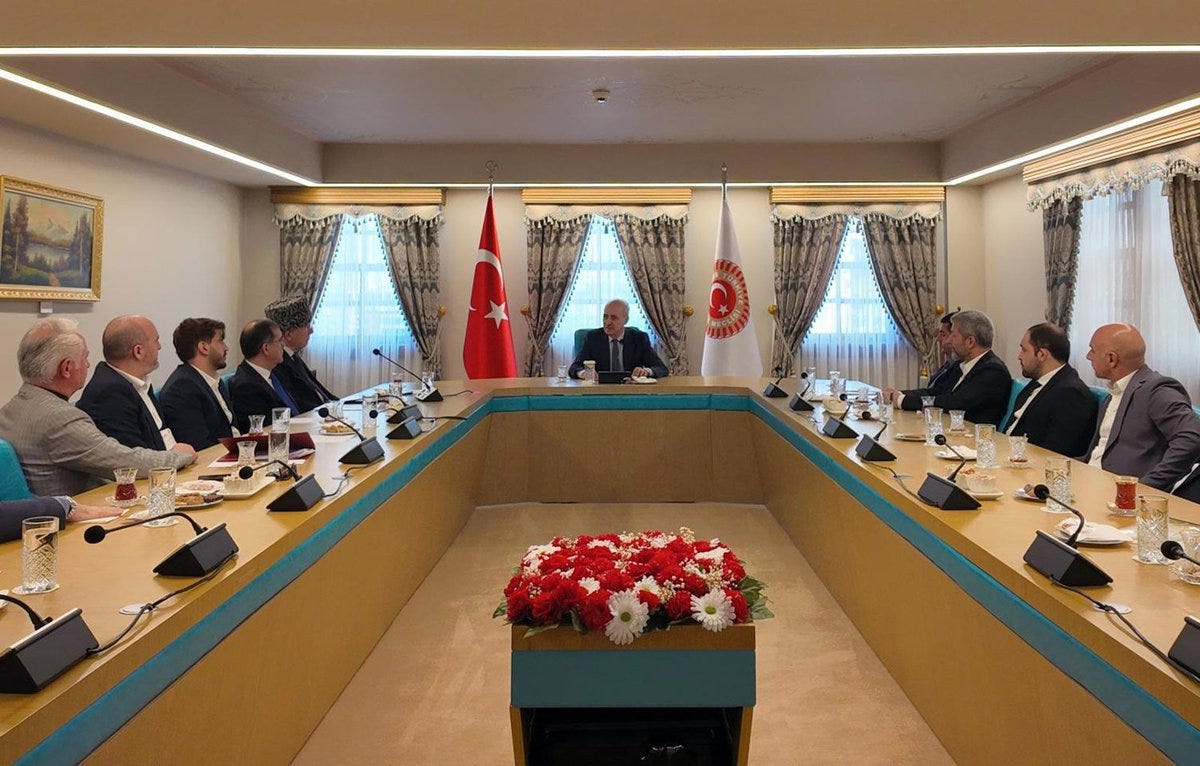Abkhazia Weekly Brief | Issue 6
"True leaders understand that leadership is not about them but about those they serve. It is not about exalting themselves but about lifting others up."

Welcome to this week's edition of the Abkhazia Weekly Brief.
The past five issues of the Abkhazia Weekly Brief were shared on Fridays, but from now on, it will be available on Sundays. You can share your feedback and suggestions about the Abkhazia Weekly Brief and AW in general in the comments or by emailing us at info@abkhazworld.com. Enjoy reading.
On May 21, Abkhazia observed a day of mourning – the Day of Remembrance for the Victims of the Russo-Caucasian War. 160 years ago, hundreds of thousands of Abkhazians, Abazins, Ubykhs, and Circassians were forcibly deported to the Ottoman Empire. Many of them perished on the way due to hunger and epidemics. Today, the descendants of the Abkhazian/Circassian diaspora live in 50 countries around the world. The largest Abkhazian/Circassian diaspora resides in Türkiye.









To honour this tragic chapter, a series of events have been organised by the State Committee for Repatriation and the State Committee for Youth and Sports. In conjunction with these memorial activities, the Abkhazian State University hosted a four-day International Scientific Conference titled "The Caucasian War: Lessons of History and Modernity," dedicated to the memory of renowned historian Georgy Dzidzaria. Scholars from various cities, including Moscow, St. Petersburg, Stavropol, Grozny, Makhachkala, Cherkessk and Maykop, gathered to present their research and perspectives.
The report by Georgy Anchabadze, son of the renowned Abkhazian historian Zurab Achba (Anchabadze), and the first rector of Abkhazian State University, was also published by Apsnypress. He refers to the conflict as the "Caucasian (Russian-Highland) War" and focused on how historical assessments of the events and figures have evolved over time in the Russian Empire and the USSR.
It is not surprising that in all five years of his presidency, Aslan Bzhania has never addressed anything for May 21, a day of mourning, for the descendants of the exiles or his compatriots with words of sympathy on this tragic date.
Last month, on April 24th, President Aslan Bzhania addressed the Armenian people on the Day of Remembrance of the Armenian Genocide victims. "Today, we mourn together with the Armenian people. In our country, as throughout the world, we honour the memory of the victims of the early 20th-century tragedy. Abkhazia's stance has been and remains consistent: we have always believed that there can be no justification for the mass murder of people. Such events cannot be erased from people's historical memory."
The same day, we shared President Aslan Bzhania's this message and added a note as follows: “We should note that Aslan Bzhania did not utter a single word, aside from attending official ceremonies, about the victims killed and displaced during the war, during the Commemoration Days of the Victims of the Russian-Caucasian War, held on May 21.”
And this is our post on 21 May 2024: History and we will remember Bzhania with shame!
Abkhazian poet Gennady Alamia spoke about the unsuccessful attempts to erect a monument to the Ubykhs, who once lived in today’s Krasnaya Polyana. He also mentioned the refusal of the Sochi Olympics organisers to acknowledge the Caucasian ethnic groups that once inhabited this area during the opening ceremony. Additionally, he recited a poem dedicated to the muhajirs.
Abkhazian historian Soslan Salakaya, in his speech, discussed the name of the war. He believes that the term "Caucasian War" is vague and needs revision and discussion. The previously used term "Russo-Caucasian War" mixes an ethnic definition with a territorial one. He argues that the essence of this war is "in the national liberation struggle of the Caucasian highlanders against the tsarist colonisers." He also examined the role of the Abkhazians in this war.
A video conference organised by the Russian agency "Sputnik" in Abkhazia, initiated by the Center for Strategic Initiatives "Abkhazia and Russia in the Context of New Geopolitical Realities." During this event, Secretary of the Security Council Sergey Shamba stated that Abkhazia does not consider the creation of confederative relations between Georgia and Abkhazia to be a realistic scenario. However, he expressed hope for "another format, another integration into the Union State" of Russia and Belarus.
"We see our future in a model similar to the existing Union State between Russia and Belarus. We are ready to participate in such a model of cooperation. The new world order will depend on how events in Ukraine unfold. It is already clear to us that it will be a multipolar world.
Regarding the current situation in Georgia, there are many expert opinions on its future developments. Experts conclude that Georgia is shifting its foreign policy from West to East, with plans to establish some form of confederative relations. Some speculate that Russia might eventually withdraw its recognition of Abkhazia's independence. This speculation arises from the situation in Georgia, leading many experts to believe that Russia allegedly wants to create a confederation between Georgia and Abkhazia.
Of course, we must consider various possible developments, although we do not view this scenario as realistic. We still hope for a different format, another form of integration, more like the Union State with Russia and Belarus."
― Sergey Shamba
The Telegram channel "Abkhazia-Centre" reacted similarly to Sergei Shamba's statement:
"Secretary of the Security Council of Abkhazia Sergey Shamba's speech during the Sukhum-Moscow video conference left a strange and suspicious impression. A clear and definite 'no' to the possibility of a confederation with Georgia was not stated. It gives the impression that the fate of Abkhazia is being decided not in Abkhazia, but beyond its borders," the author concluded.
See AW’s comment on the speculations regarding “confederation”.
On May 22, the last bell rang in Abkhazian schools. About 2,000 students graduated. Twelve graduates are candidates for medals. These were the three working days of this week.
Check out our new graduate celebrating with his mom by performing a traditional Adyghe (Circassian) dance Mezdegu [also known Sheshen]. — Facebook video
Economist Akhra Aristava wrote a Facebook post discussing the problems facing Abkhazian citizens, specifically issues of wage and pension increases. He believes that people are being diverted from discussing real problems:
“Citizens must first decide which issues they want resolved, whether it be salaries of 50-70 thousand, pensions of 15-20 thousand, access to quality healthcare, or quality education for their children. They need to make it clear to politicians what is most important to them. Only then should they consider which team can implement these solutions. Citizens are the masters of the state, granting power for five years through elections to solve their problems.”
Prime Minister of Abkhazia, Alexander Ankvab, met with the head of the International Committee of the Red Cross (ICRC) mission, Chyngyz Rayimbekov, and the ICRC representative on missing persons in the Caucasus, Agnes Coutou. The head of the mission emphasized the importance of this meeting ahead of the upcoming session of the trilateral coordination mechanism, which will take place in Istanbul on May 29. Agnes Coutou briefed the Prime Minister on the work carried out over the past nine months related to the search for missing persons from the Georgian-Abkhazian War of 1992-1993.
A controversy has erupted over a sign at the entrance to the village of Tsykhibyn, displaying name, Shaumyanovka. This village, like many in Abkhazia, is mainly inhabited by descendants of Armenian refugees from the Ottoman Empire. The 2011 census recorded its population as 2,145, higher than before the Georgian-Abkhaz war, which is rare for Abkhazian settlements. The sign at the entrance to the village was removed, and a new sign with the correct name of the village was installed.
Abkhazian Telegram channels report that parliament members were denied entry to the Sukhum airport. Journalist Inal Khashig wrote as follows on his Telegram channel: “there are plenty of territories in Abkhazia where local authorities are barred from entering, and now it seems the airport is among them. There are many Russian military personnel, paramilitaries, and civilians operating under the guise of the military in Abkhazia. Historically, our authorities did not thoroughly review the interstate agreements that were signed and later ratified by parliament. At one time, even the president of the country needed permission from the unit commander to enter a military facility. Essentially, a commander could forbid the President of Abkhazia from entering.”
According to Respublica Telegram channel, the family of Aslan Bzhania has been demonstrating remarkable entrepreneurial “skills” and career growth over the past four years. Aslan Bzhania's nephew, David Gabelia, has been appointed as the Deputy Minister of Energy and Transport of the Republic of Abkhazia.
Public figure Tengiz Dzhopua suggested that the presidential term should be reduced to one year. He argued that this would keep the president continuously focused on upcoming elections. Dzhopua criticised current presidents for suddenly showing interest in culture, demographics, and public welfare only around election time. He pointed out that they often engage in highly visible activities like inspecting infrastructure projects and visiting public institutions, giving the impression that these improvements were personally funded. Djopua called for a more genuine and consistent approach to governance, free from the theatrics associated with re-election campaigns.
A few weeks ago, David Dasania, a linguist and researcher, announced that Yandex plans to incorporate several North Caucasian languages into its Translator service. In his new post, Dasania announced that Yandex has agreed to integrate the Abkhaz language into its translation program. This integration means that anyone with internet access will soon be able to translate sentences into Abkhaz, thereby facilitating the learning and usage of the language worldwide.
The Istanbul Caucasus Associations Coordination Group held a meeting with the Speaker of the Turkish Grand National Assembly, Mr. Numan Kurtulmuş. During the meeting, discussions included the increasing legal and humanitarian issues faced by migrants from the Caucasus and Syria. Additionally, the situation in Abkhazia and South Ossetia and their relations with Türkiye were addressed.
Hoping to share another issue with you next Sunday. Have a great day and a wonderful week!







